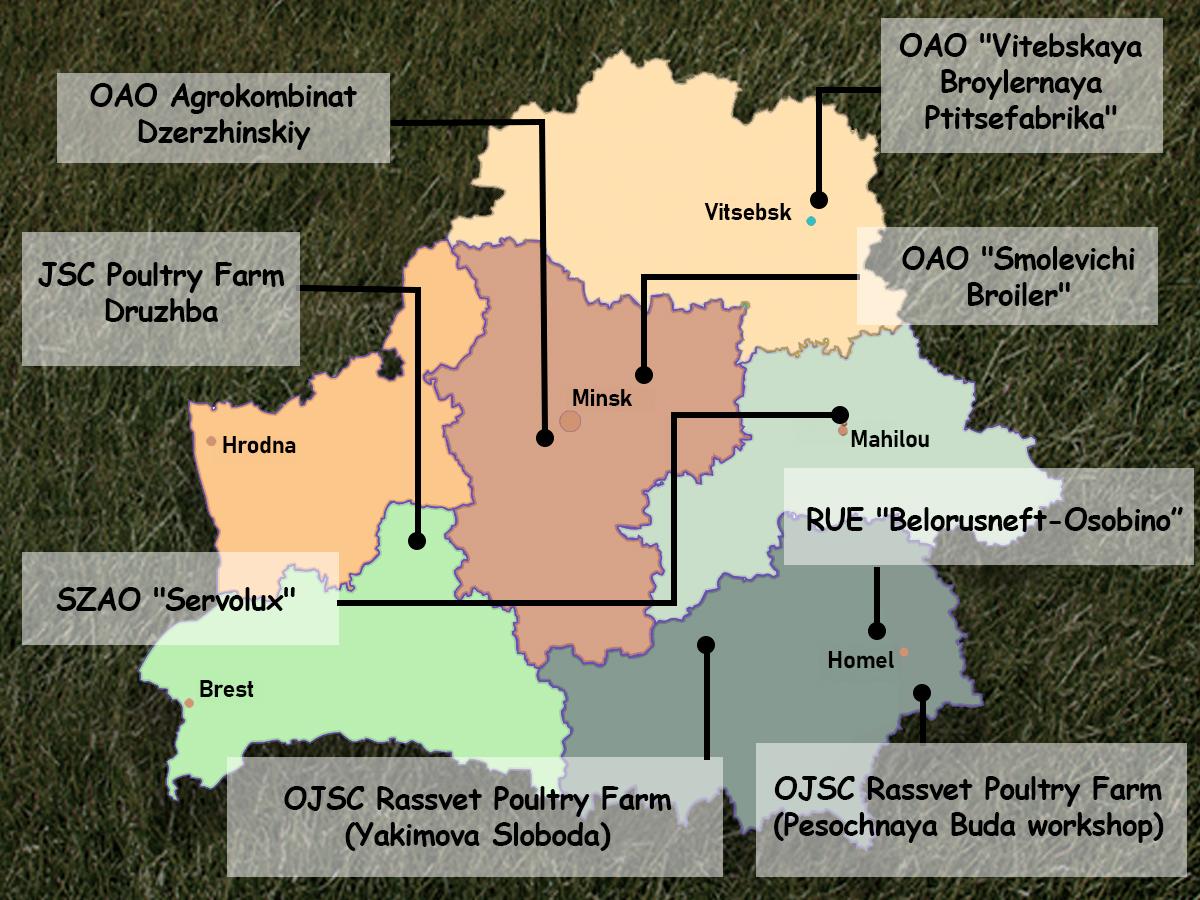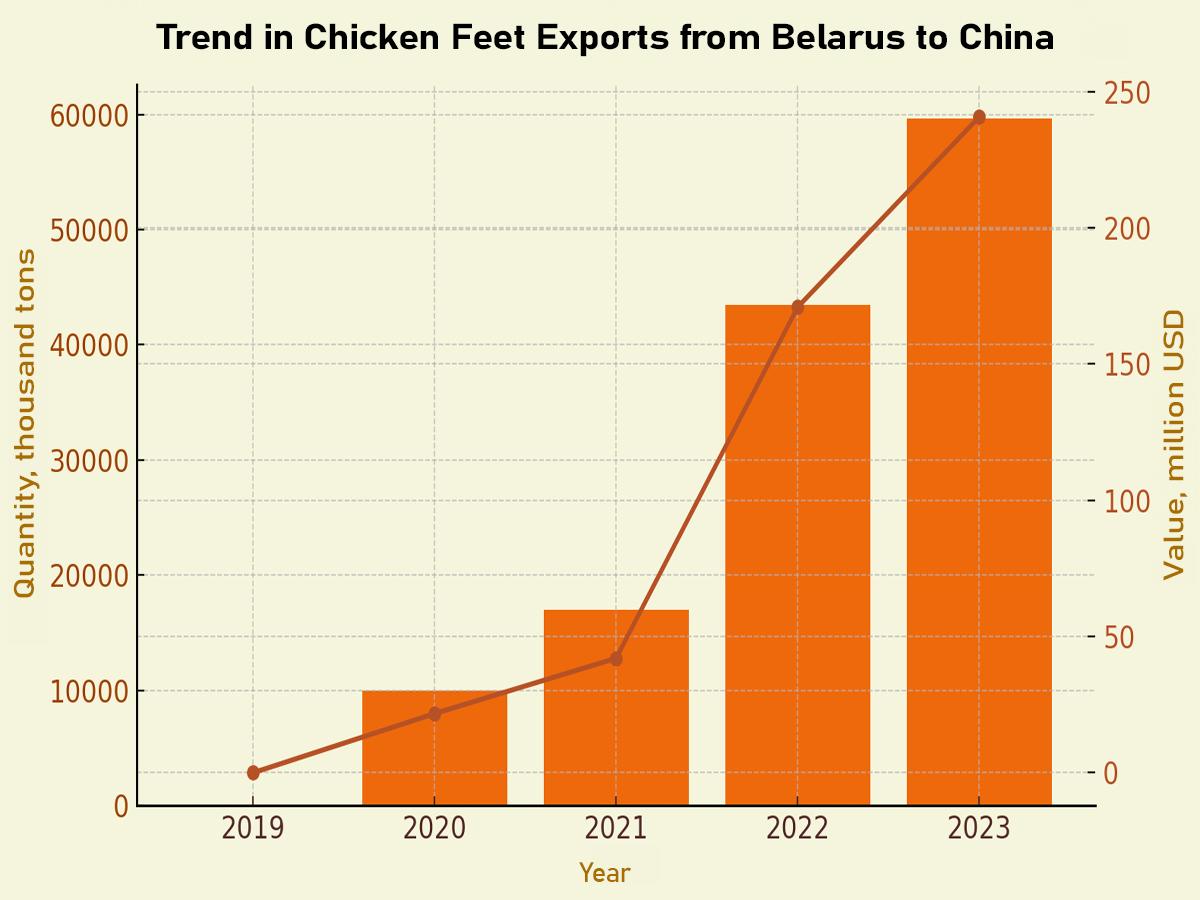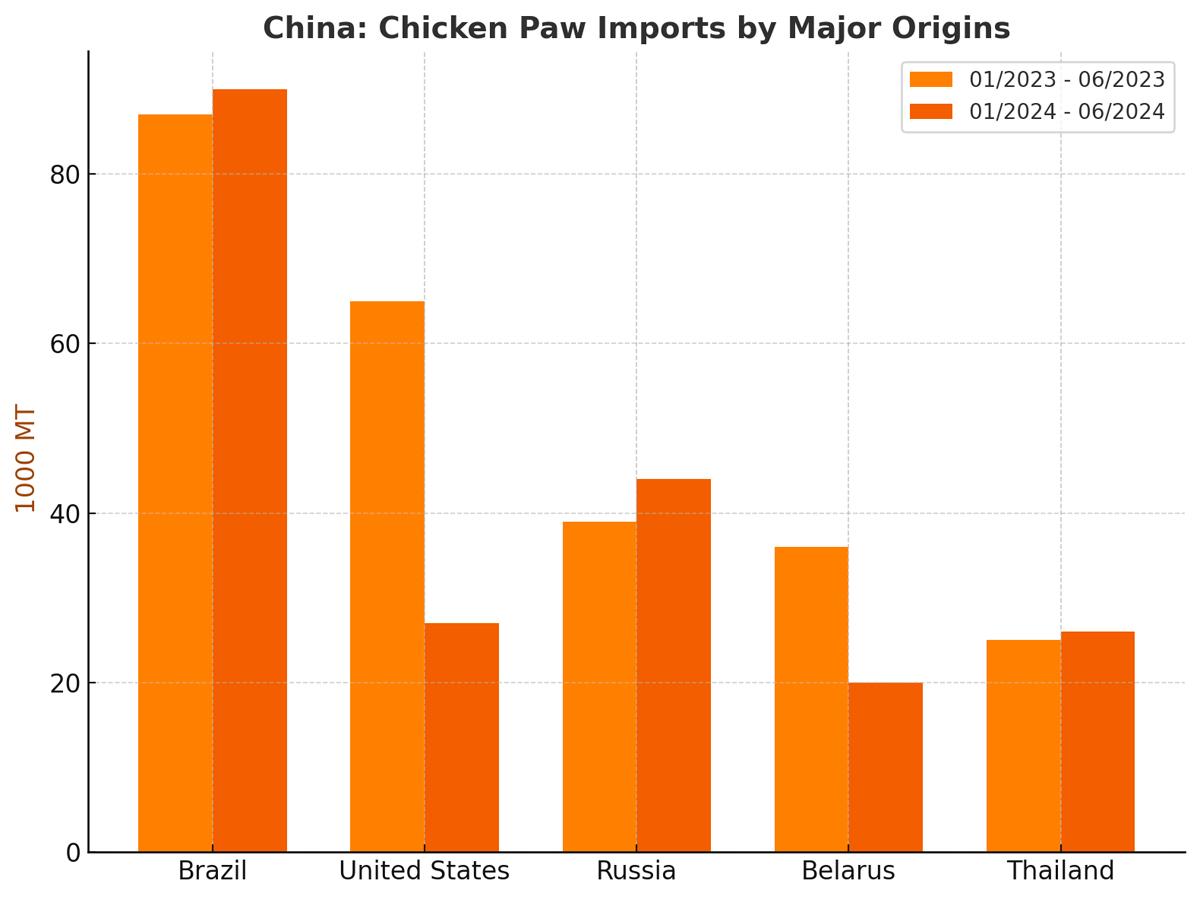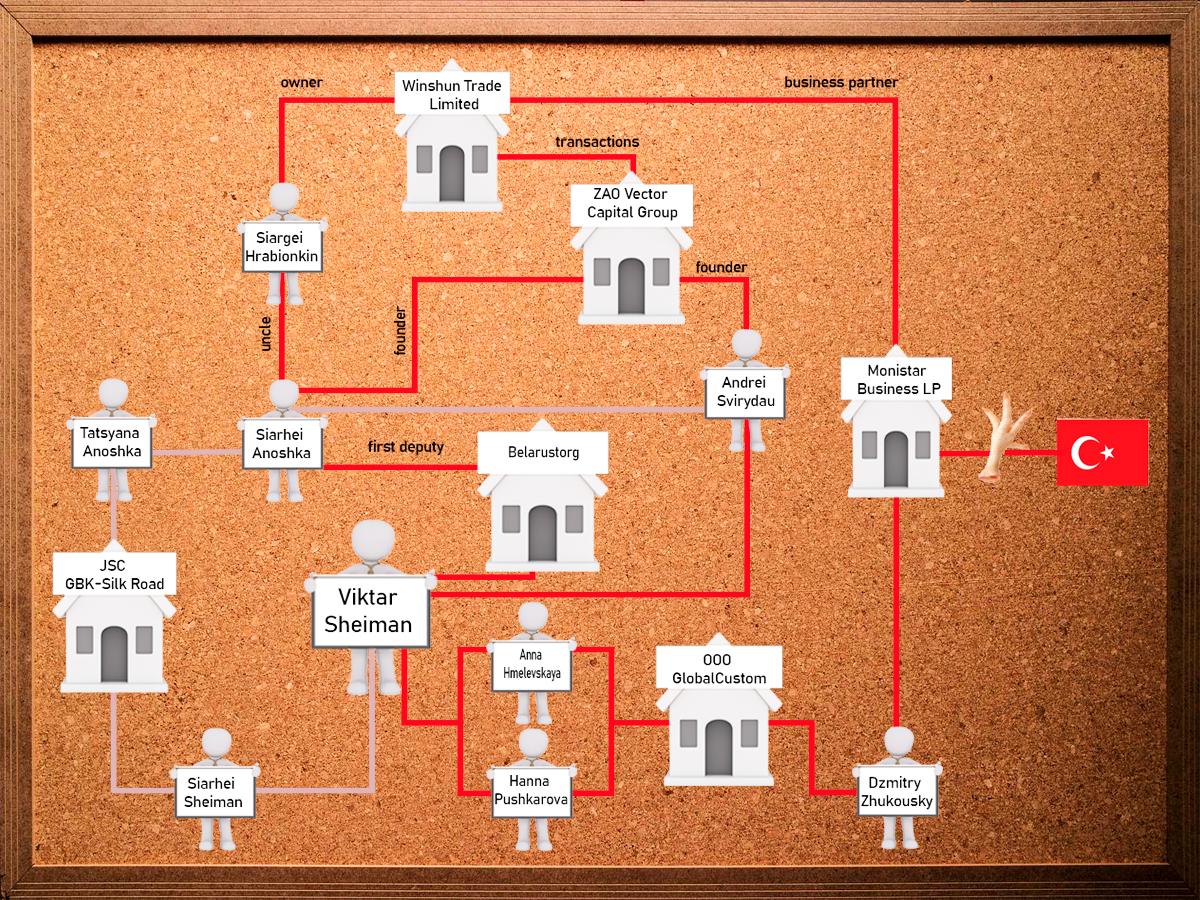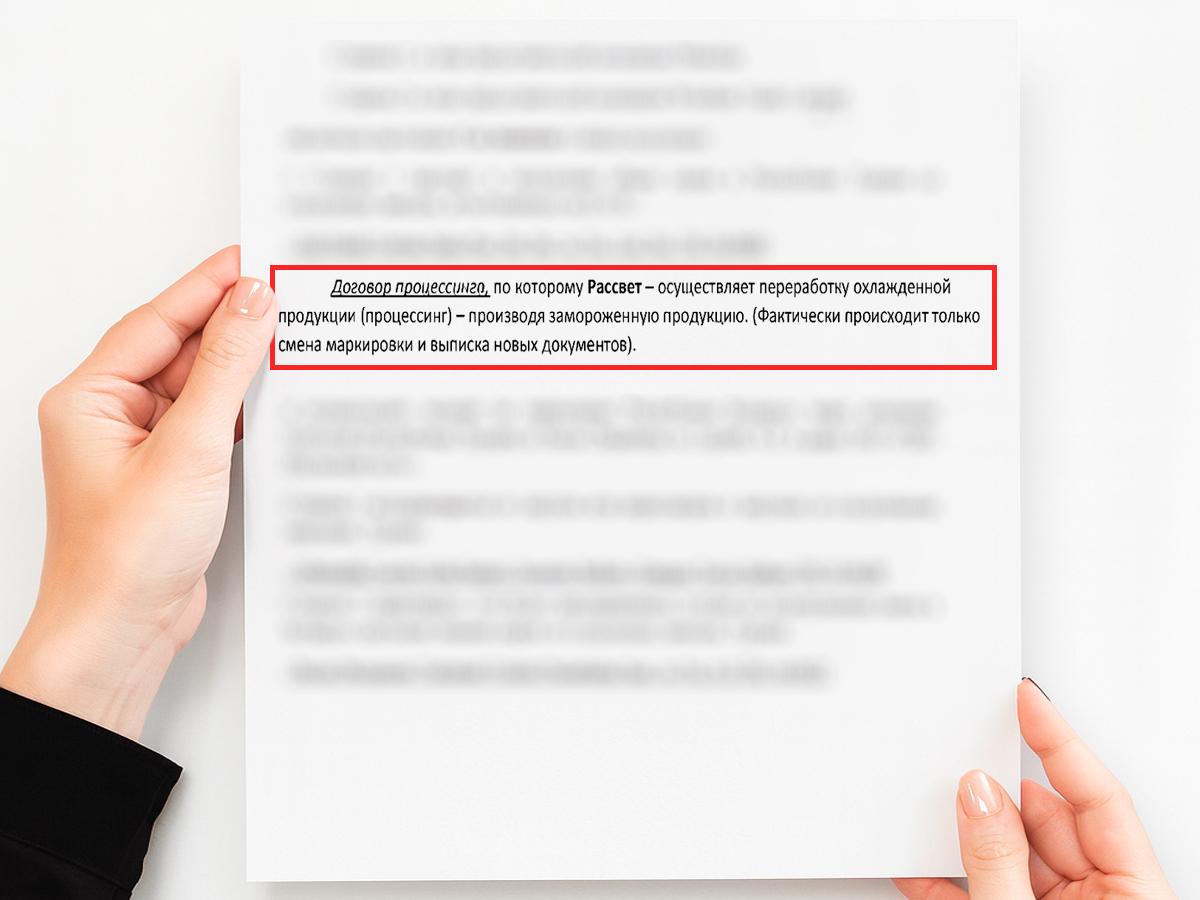This investigation reveals how businesspeople close to Lukashenko's regime damaged Belarus's access to China's lucrative chicken feet market through an illegal re-export scheme.
The key findings:
- China considers chicken feet a delicacy, with imports worth nearly $2 billion in 2024
- Belarus had become China's 4th largest supplier of chicken feet by 2023, with exports worth $240 million
- A complex scheme was uncovered where Turkish chicken feet were being illegally re-labeled as Belarusian products
- The scheme involved companies linked to Viktar Sheiman, one of Lukashenko's closest associates
- The operation used multiple shell companies to hide profits offshore and evade Belarusian taxes
- When discovered, China responded by banning 11 out of 13 Belarusian poultry exporters
The consequences have been severe - Belarus has essentially lost access to this premium market. Losses in the first year alone will amount to $140 million. While the scheme's organizers profited personally, legitimate Belarusian poultry producers are now blacklisted by Chinese authorities.
This marks the first known case where Belarus was caught deceiving China, one of its few remaining strategic partners. Previous similar schemes had targeted Russia and the EU.
This case illustrates how corruption among regime-connected businesspeople has directly harmed Belarus's economic interests and international trade relationships.
This investigation was prepared with the support of the Belarusian activist group Rabochy Ruch, the Ukrainian cyber community KibOrg, and the Belarusian group Cyber Partisans.
The taste of Phoenix claws
Chicken feet, unlike chicken legs, are not a popular dish in the West or in Belarus where they are often used to produce animal feed. But in China they are considered a delicacy and are often called Phoenix claws.
In recent decades the demand for chicken feet has followed the growth of incomes of the Chinese population. In today's China chicken feet can cost more than chicken meat and even beef. The delicacy is so popular that even the world-famous KFC fast food chain has added it to the menu of its Chinese restaurants.
China does not raise enough chicken to meet the market needs for this product. In 2024 alone, the country imported 450 million kg of chicken feet for almost $2 billion. The main exporters of poultry to China are Brazil, the United States, Argentina and Russia.
However, it is not easy to access this market. China imposes strict sanitary requirements due to the risk of avian viruses that can be deadly to humans. For example, in 2023, imports from Argentina were banned. This year they were restored, but imports from Brazil were blocked for the second time in the last three years.
In addition, some countries say that Beijing uses customs restrictions for political purposes. In 2015, China stopped importing chicken feet from the US due to bird flu, but when the epidemic passed, it did not allow American products to enter its market for another two years.
Good relations between Beijing and Minsk provided a window of opportunity for Belarus. But this opportunity was wasted after businessmen close to Lukashenko turned this profitable export route into a scam that resulted in tough restrictions.
How Belarus lost the Chinese poultry market
“Only two [Belarusian] factories are working [today for China] — ours and Vitebsk,” explains Volha Sen from the marketing department of the JSC Poultry Farm "Druzhba in the Brest region.
A BIC journalist called her and introduced herself as a potential client. When the journalist asked her about the reason for the termination of exports to China, Sen replied: “Well, I don’t know. This is more of a question for the Chinese customs authority, not for me.”
About a month before that conversation, in early June 2025, Aleksandr Lukashenko visited China for a “family meeting,” as he himself described it. The leaders of Belarus and China smiled at the cameras, called each other friends, and exchanged gifts. Neither official statements nor state media reports mentioned that Chinese de facto economic sanctions had been imposed against Belarus for more than half a year.
In 2018, five Belarusian poultry farms gained access to the Chinese market. In 2020, China accredited the next three farms, and some of them received separate licenses for the supply of by-products, including chicken feet.
Belarusian exports of chicken feet to China grew from 10,000 tons in 2020 to 60,000 tons in 2023. In the first half of 2023 Belarus became the top 4 supplier, behind global meat production giants Brazil, the United States and Russia, taking over 11% of the entire export market for chicken feet in China. Belarus’ 2023 revenue from shipments of chicken feet to China amounted to 250 million dollars. (BIC calculation based on Chinese import statistics).
Such explosive growth however attracted a Chinese inquiry. A Chinese inspection revealed that Belarus was supplying 30–40% more chicken feet than it was capable of producing. That meant that Belarusian factories were purchasing foreign products and selling them to China under the guise of their own, which is prohibited by the terms of accreditation. [*]
From August to December 2023, three out of five licensed chicken feet suppliers lost their right to export. And in December 2024, after a visit by a Chinese delegation to Belarusian enterprises, Beijing almost completely blocked the import of poultry products from Belarus. 11 out of 13 accredited poultry farms were banned.
Minsk was allowed to save face. Technically, the restrictions were imposed not by China, but by the Belarusian Ministry of Agriculture and Food. The agency suspended the certificates after consultations with the Chinese side. All farms that were denied export permits will have to go through the procedure for obtaining new certificates.
Under the guise of clients, we contacted six poultry farms and found out that the exports have not resumed eight months after the restrictions were imposed.
“We are not [exporting] to China yet... A number of Belarusian enterprises have export restrictions. That is why we have suspended exports to China for the time being,” Dzmitry Herasimenka, head of the trade department of the company RUE "Belorusneft-Osobino", said in a telephone conversation.
BIC journalists got a similar reply from Alena Herus, deputy director for commercial affairs of the OJSC “Rassvet Poultry Farm”: “We are currently closed. We had shipped since 2021.” She clarified that the farm suspended cooperation with China in 2024 and is now waiting for re-certification.
During the calls, we mentioned the names of the companies that organized the re-export scheme and caused damage to the Belarusian poultry industry. But all our interlocutors denied having worked with these companies, and some claimed that they were hearing these names for the first time.
Foreign companies with Belarusian footprint
The agreement to re-export Turkish chicken feet through Belarus to China was concluded in 2022. The BIC received this document from the labour activist group Rabochy Ruсh.
The scheme to supply chicken feet from Turkey to China via Belarus looks as follows. First a British company called Monistar Business LP purchases the feet in Turkey and sells them to the Belarusian company JSC “GBK-Silk Road”. In Belarus the chicken feet are disguised as products of the “Rassvet Poultry Farm” and then exported to China in a convoluted way. GBK-Silk Road sells to the Chinese company Winshun Trade Limited, but this is just another intermediary. Winshun Trade Limited then sells this cargo back to Monistar - the same company that purchased the cargo from Turkey. Finally Monistar delivers the feet to the final Chinese wholesale buyer - Cloudtop Agriculture Far East Limited.
All the companies in the chain have links to each other, which intersect around Viktar Sheiman, the closest associate of Aleksandr Lukashenko, Belarus’ authoritarian ruler. [*] [*] [*]
Family connections
There was also an unusual clause in the contract Winshun Trade Limited promises its British partner to make sure no other suppliers could deliver from the Turkish producer to the Belarusian market. Fulfilling such an agreement requires connections in the high offices of the Belarusian government.
Among the owners of Winshun Trade Limited in 2023 was Siargei Hrabionkin, a citizen of Belarus and nephew of Siarhei Anoshka (a subject of the BIC investigation into the business of the glass king of Belarus, Alexander Muraviev). [*] [*]
Anoshka is the former deputy director of the Gosudarstvennoe predpriyatie Belarustorg, one of the structures in the Presidential Affairs Department during the leadership of Viktar Sheiman, one of the oldest and closest cronies of Lukashenko.
In 2021, together with his former deputy Andrei Svirydau, Anoshka founded ZAO Vector Capital Group. [*] [*] [*] [*] This company became the foundation for Sheiman's new shadow business empire. Anoshka's wife Tatsyana Anoshka, who is also Hrabionkin's aunt, runs the company GBK-Silk Road in Belarus, which acts as an intermediary in a scheme to re-export chicken feet from Turkey to China. [*] [*] And among the shareholders of GBK-Silk Road, we found Siarhei Sheiman, son of Viktar Sheiman.
The British company Monistar Business also has a Belarusian footprint. This company issued a power of attorney to the Belarusian citizen Dzmitry Zhukousky, who in 2018 worked in another business of Viktar Sheiman - the company OOO Globalcustom (founded jointly by Sheiman’s reported lover at the time together with the wife of his nephew). [*]
The BIC contacted both Siargei Hrabionkin and Dzmitry Zhukousky by phone. Hrabionkin claimed he had never heard of Winshun Trade Limited and that Tatsyana Anoshka was not his aunt. Zhukovsky said that he had nothing to do with the case and hung up.
We also did not receive any response from Winshun Trade Limited. In reply to the journalistic inquiry, the company’s chief legal advisor demanded that we disclose the sources of our information, including names, contact details, and documents confirming its accuracy, notarized, which constitutes a violation of journalistic standards. In addition, the letter contains warnings of possible legal consequences for the BIC, including appeals “to the competent authorities of Hong Kong, the PRC, and the Embassy of the PRC in Minsk.” [*] [*]
How the money was made
But why use such a complex chain of passing the cargoes between related firms in different countries? The purpose seems to be to hide the profits away from Belarus and its tax authorities.
We used one shipment, in which the batch weight and container number matched, to trace the entire re-export chain. Turkish chicken feet were supplied to Belarus by Monistar Business. Here, they were converted from a Turkish to Belarusian product at the "Rassvet Poultry Farm". Then they were supplied to the company “GBK-Silk Road”.
During the conversation with Alena Herus, the deputy director for commercial affairs of the "Rassvet Poultry Farm", a BIC journalist asked whether the farm had previously worked with “GBK-Silk Road”. After a long pause Herus asked about the purpose of such interest and subsequently denied having worked with that company. The conversation ended with an angry “goodbye”, and Herus hung up after another question about Sheiman’s company.
However, according to documents in BIC’s possession, GBK-Silk Road sold that batch of chicken feet to Winshun Trade Limited under the brand name "Rassvet". The export price declared at the Belarusian customs was $2.45 per kilogram. After that, Winshun Trade Limited resold this batch back to the British Monistar Business at $2.89 per kg, and the latter sold it to the final buyer, the company Cloudtop Agriculture Far East Limited, at $3.46 per kg. The chicken feet were therefore transported from Belarus to China, but they were sold three times in the process.
The final buyer price turned out 41% higher than the price declared to Belarusian customs. This additional mark up was therefore split between the two intermediary companies based outside of Belarus.
A BIC journalist called the director of GBK-Silk Road, Tatsyana Anoshka, to ask for her comment. After the first question about the reason for selling chicken feet to China at a low price, Anoshka hung up.
We also sent a written request to the company GBK-Silk Road, but it has remained unanswered.
How the scheme could work
A document discovered by activists of Rabochy Ruсh sheds some light on the possible mechanics for re-exporting chicken feet to China. This is an instruction for participants in a similar scam. Instead of Turkish chicken feet, that deal was about Ukrainian chicken wings. [*] [*] [*]
Instead of Winshun Trade Limited and Monistar Business, the operations were carried out through the Belarusian company OOO Sohra owned by Alexander Zaytsev, a former assistant to Viktor Lukashenko, Aleksandr Lukasheko's son. But the foreign products were “transformed into Belarusian” by the same "Rassvet Poultry Farm".
The instruction in the leaked document states that chicken wings are to be purchased from a Ukrainian factory in packages with local branded stickers. After arriving in Belarus, the boxes are to be sent to "Rassvet Poultry Farm", where all the stickers are changed to Belarusian ones.
All this is described in detail in the instructions: “Processing agreement, under which Rassvet — carries out the processing of chilled products (processing) — producing frozen products. (In fact, only the labeling is changed and new documents are issued) [...] All products that will later go to the PRC must have only Rassvet labeling.”
The document indicates the phone numbers of each person involved in the scheme and personal responsibilities in the re-export chain. Among them was the name of Alena Herus, the previously mentioned deputy director for commercial affairs of the "Rassvet Poultry Farm".
Bad consequences for Belarus
After China uncovered the scheme in 2024 and banned imports of poultry and by-products for 11 out of 13 Belarusian poultry farms, Belarus was practically cut off from the world's largest poultry market worth billions of dollars. According to BIC estimates, the loss of potential revenue could amount to $140 million in the first year of the ban.
While the companies involved in the schemes and the people behind them have earned tens of millions of dollars, a large part of which was funneled abroad, Belarusian state-owned enterprises have found themselves on the Chinese blacklist and are losing out on potential export profits every day.
This is not the first time Belarus has been involved in international smuggling schemes. In the 2000s, foreign cane sugar was smuggled to Russia under the guise of Belarusian beet sugar. Later, fuel was supplied to the EU under the guise of solvents. In the 2010s, “Belarusian” shrimp, pineapples, and Parmesan cheese became notorious exports to Russia, bypassing Russian sanctions against EU products.
These schemes resulted in more customs restrictions and worsening trade conditions for Belarus. But the negative experiences did not stop Lukashenko's cronies from new similar schemes. The scheme described in this investigation is the first known attempt by Lukashenko’s “wallets” to deceive not only Russia, but also China, one of the few strategic partners of Minsk. Belarus, at the time of publication, is continuing to bear the cost of reputational damage and economic losses.
This is a shortened recap of the investigation. You can visit the Belarusian or Russian language page for the full version.



